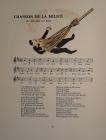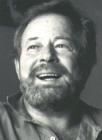"Wo sind eure Lieder –
Eure alten Lieder?"
Fragen die aus andern Ländern
Wenn man um Kamine sitzt
Mattgetanzt und leergesprochen
Und das High-Life-Spiel ausschwitzt!
Ja, wo sind die Lieder –
Uns're alten Lieder?
Nicht für'n Heller oder Batzen
Mag Feinsliebchen barfuss zieh'n
Und kein schriller Schrei nach Norden
Will aus einer Kehle flieh'n!
Tot sind uns're Lieder –
Uns're alten Lieder!
Lehrer haben sie zerbissen
Kurzbehoste sie verklampft –
Braune Horden totgeschrien
Stiefel in den Dreck gestampft!
Tot sind uns're Lieder –
Uns're alten Lieder!
Eure alten Lieder?"
Fragen die aus andern Ländern
Wenn man um Kamine sitzt
Mattgetanzt und leergesprochen
Und das High-Life-Spiel ausschwitzt!
Ja, wo sind die Lieder –
Uns're alten Lieder?
Nicht für'n Heller oder Batzen
Mag Feinsliebchen barfuss zieh'n
Und kein schriller Schrei nach Norden
Will aus einer Kehle flieh'n!
Tot sind uns're Lieder –
Uns're alten Lieder!
Lehrer haben sie zerbissen
Kurzbehoste sie verklampft –
Braune Horden totgeschrien
Stiefel in den Dreck gestampft!
Tot sind uns're Lieder –
Uns're alten Lieder!
Contributed by Bernart Bartleby - 2020/2/20 - 22:36
Language: English
Traduzione inglese e note di jemflower da Lyrics Translate
THE OLD SONGS
"Where are your songs -
Your old songs?"
We are often asked by those from other countries
When we're sitting by the fireside
Having danced to exhaustion and said all that was to say
Transpiring after the merriment! (1)
Yes, where are the songs -
Our old songs?
Not for a farthing or a shilling (2)
My darling will walk barefoot (3)
And no shrill call for the north
Will come out of our throat! (4)
Dead are our songs -
Our old songs!
Teacher have chewed them apart
Boys in shorts have played them with poor guitar accompanying - (5)
Brown hordes have shouted them to death (6)
Boots have tramped them into the mud!
Dead are our songs -
Our old songs!
"Where are your songs -
Your old songs?"
We are often asked by those from other countries
When we're sitting by the fireside
Having danced to exhaustion and said all that was to say
Transpiring after the merriment! (1)
Yes, where are the songs -
Our old songs?
Not for a farthing or a shilling (2)
My darling will walk barefoot (3)
And no shrill call for the north
Will come out of our throat! (4)
Dead are our songs -
Our old songs!
Teacher have chewed them apart
Boys in shorts have played them with poor guitar accompanying - (5)
Brown hordes have shouted them to death (6)
Boots have tramped them into the mud!
Dead are our songs -
Our old songs!
The song is difficult to translate because of the many allusions.
The record is from the late 60ies, meanwhile people changed their minds and some of our folksongs are returning.
(1) In the 60ies and 70ies the anglicism High-Life was used for having a party.
(2) Heller and Batzen are old coins, I used farthing and shilling to give a basic idea. Actually it's a title of a song, where the wanderer has spent both coins for beverages.
(3) Feinsliebchen du sollst mir nicht barfuß gehen (darling you should not walk barefoot), is another song.
(4) The shrill call comes from the geese flying north, also from a popular song "Wildgänse rauschen" (Wildgeese fly by) written in world war I.
(5) It means they were played by the members of the "Wandervogel" movement (I can't see what's wrong with it), Klampfe is a slangword for guitar
(6) Some Nazi organisations preferred brown shirts. Thus in the author's eyes, the songs were abused and sullied by them. That is the reason why noone wants to sing them any longer.
The record is from the late 60ies, meanwhile people changed their minds and some of our folksongs are returning.
(1) In the 60ies and 70ies the anglicism High-Life was used for having a party.
(2) Heller and Batzen are old coins, I used farthing and shilling to give a basic idea. Actually it's a title of a song, where the wanderer has spent both coins for beverages.
(3) Feinsliebchen du sollst mir nicht barfuß gehen (darling you should not walk barefoot), is another song.
(4) The shrill call comes from the geese flying north, also from a popular song "Wildgänse rauschen" (Wildgeese fly by) written in world war I.
(5) It means they were played by the members of the "Wandervogel" movement (I can't see what's wrong with it), Klampfe is a slangword for guitar
(6) Some Nazi organisations preferred brown shirts. Thus in the author's eyes, the songs were abused and sullied by them. That is the reason why noone wants to sing them any longer.
Contributed by B.B. - 2020/2/20 - 22:38
Language: Italian
Traduzione italiana / Italienische Übersetzung / Italian translation / Traduction italienne / Italiankielinen käännös:
Riccardo Venturi, 21-02-2020 15:15
Riccardo Venturi, 21-02-2020 15:15
LE VECCHIE CANZONI
“Dove sono le vostre canzoni,
le vostre vecchie canzoni?”
Chiedono quelli di altri paesi
sedendo attorno al caminetto
dopo aver ballato fino allo sfinimento e detto ogni cosa,
sudati fradici dalla baldoria ! [1]
Eh sì, dove sono le canzoni,
le nostre vecchie canzoni?
Manco per il becco d'un quattrino [2]
il bell'amore mio vuol camminare scalza [3]
e nessun grido acuto verso il nord
vuole uscire da una qualche gola! [4]
Le nostre canzoni sono morte,
le nostre vecchie canzoni!
Straziate a morsi da insegnanti,
straziate strimpellando da ragazzi in calzoncini corti, [5]
straziate a morte da orde bercianti in camicia bruna, [6]
calpestate da stivali nel fango!
Le nostre canzoni sono morte,
le nostre vecchie canzoni!
“Dove sono le vostre canzoni,
le vostre vecchie canzoni?”
Chiedono quelli di altri paesi
sedendo attorno al caminetto
dopo aver ballato fino allo sfinimento e detto ogni cosa,
sudati fradici dalla baldoria ! [1]
Eh sì, dove sono le canzoni,
le nostre vecchie canzoni?
Manco per il becco d'un quattrino [2]
il bell'amore mio vuol camminare scalza [3]
e nessun grido acuto verso il nord
vuole uscire da una qualche gola! [4]
Le nostre canzoni sono morte,
le nostre vecchie canzoni!
Straziate a morsi da insegnanti,
straziate strimpellando da ragazzi in calzoncini corti, [5]
straziate a morte da orde bercianti in camicia bruna, [6]
calpestate da stivali nel fango!
Le nostre canzoni sono morte,
le nostre vecchie canzoni!
Ciò che segue è una sorta di combinazione tra le note apposte alla traduzione inglese (tradotte e indicate sempre tra virgolette) ed alcune mie integrazioni (in corsivo).
“Questa canzone è difficile da tradurre a causa delle molte allusioni.
È stata incisa alla fine degli anni '60, e nel frattempo la gente ha cambiato idea e qualche nostra vecchia canzone sta tornando a galla.”
[1] “Negli anni '60 e '70 la locuzione inglese High-Life veniva usata per indicare una festa, un party”. La locuzione indica propriamente uno “stile di vita da ricchi”, senza limiti e senza freni. Una “vita nel lusso sfrenato”. Può darsi che sia stata usata in Germania nel senso indicato dal traduttore in inglese (non sarebbe certo il primo caso in cui una locuzione inglese assume un particolare significato in un dato paese). Da notare la costruzione del verso tedesco, dove alla lettera si “suda via” (aus-schwitzt) il “gioco della festa” (High-Life-Spiel).
[2] “Lo Heller e il Batzen sono vecchie monete, qui ho usato “farthing” e “shilling” per dare un'idea di massima. In realtà si tratta del titolo di una canzone, dove il viandante ha speso tutte e due le monete per bere.” Nella traduzione italiana, invece, ho rinunciato a cose tipo “bajocco”, preferendo il più comune “becco d'un quattrino”. La vecchia canzone si chiama Ein Heller und ein Batzen; fu scritta nel 1830 da Albert von Schlippenbach. Da notare che era molto conosciuta e cantata dalle truppe tedesche di occupazione durante la II guerra mondiale (specialmente in Francia e in Polonia), e che, quindi, da molti venne associata erroneamente con il nazismo. Si trattava invece di una canzoncina allegra e del tutto apolitica e innocua.
[3] “ 'Feinsliebchen du sollst mir nicht barfuß gehen” (“Bell'amore mio, non mi dovresti camminare scalza”) è un'altra canzone. Un'altra canzone popolare (qui anche la traduzione italiana), che trovò anche un'elaborazione da parte di Johannes Brahms:
[4] “Il grido acuto è quello delle anatre selvatiche che volano a nord. Ancora una canzone popolare, 'Wildgänse rauschen' ('Le anatre selvatiche passano in volo'), scritta durante la I guerra mondiale.” La canzone si chiama Wildgänse rauschen durch die Nacht ('anatre selvatiche attraversano la notte in volo') e fu scritta nel 1916 dal poeta Walter Flex (la musica è di Robert Götz). Fu una delle canzoni preferite dal movimento Wandervogel ('Uccello migratore'), e lo è tuttora dei boy scouts tedeschi.
[5] “Significa che erano suonate dai membri del movimento Wandervogel (e non vedo che cosa ci sia di male). 'Klampfe' è un termine gergale per 'chitarra'.” Quando il movimento Wandervogel (che, comunque, aveva una forte componente nazionalista tedesca) fu sciolto nel 1933 all'avvento del nazismo, i suoi membri vennero inquadrati nel nuovo associazionismo obbligatorio nazista, vale a dire la Hitlerjugend (Gioventù Hitleriana). Alla Hitlerjugend prima, e alla Wehrmacht poi, passarono in blocco tutte le canzoni dei Wandervogel.
[6] Alcune organizzazioni naziste preferivano le camicie brune. Quindi, secondo l'autore, si fece abuso delle canzoni ed esse vennero infangate. Per questo motivo nessuno vuole più cantarle.” Questo è il sugo di tutta la storia. Però, nonostante la grande stima che nutro verso Franz-Josef Degenhardt, c'è da dire che diverse di queste “vecchie canzoni” tedesche provenivano già da certi ambienti ed erano immerse nella Kultur militarista tedesca. Specialmente quelle dei Wandervogel, fecero pochissima fatica a passare nel repertorio nazista, alle quali si adattarono benissimo. Secondo me bisogna tenerne conto. [RV]
Questa è la versione di Daniel Kahn:
Wo sind eure Lieder,
eure alten Lieder?
fragen die aus anderen Ländern,
wenn man um Kamine sitzt,
mattgetanzt und leergesprochen
und das high-life Spiel ausschwitzt.
Vu zenen di lider
ayere alte lider
fregn di fun andere lender
ven me zitst bay fayer-hits
flakhgetantst un pustgeredt
alts multikulti oysgeshvitst
Ja, wo sind die Lieder,
unsre alten Lieder?
Nicht fürn Heller oder Batzen
mag Feinsliebchen barfuss ziehn,
und kein schriller Schrei nach Norden
will aus meiner Kehle fliehn.
Toyt zenen di lider
ayere alte lider
lerer hobn zey tsebisn
farrumplt hot zey amolek
broyne hordes toyt geshrign
tsetrotn inem shrivl-drek
Tot sind unsre Lieder,
unsre alten Lieder.
Lehrer haben sie zerbissen,
Kurzbehoste sie verklampft,
braune Horden totgeschrien,
Stiefel in den Dreck gestampft.
(Franz-Josef Degenhard/Daniel Kahn)
Wo sind eure Lieder,
eure alten Lieder?
fragen die aus anderen Ländern,
wenn man um Kamine sitzt,
mattgetanzt und leergesprochen
und das high-life Spiel ausschwitzt.
Vu zenen di lider
ayere alte lider
fregn di fun andere lender
ven me zitst bay fayer-hits
flakhgetantst un pustgeredt
alts multikulti oysgeshvitst
Ja, wo sind die Lieder,
unsre alten Lieder?
Nicht fürn Heller oder Batzen
mag Feinsliebchen barfuss ziehn,
und kein schriller Schrei nach Norden
will aus meiner Kehle fliehn.
Toyt zenen di lider
ayere alte lider
lerer hobn zey tsebisn
farrumplt hot zey amolek
broyne hordes toyt geshrign
tsetrotn inem shrivl-drek
Tot sind unsre Lieder,
unsre alten Lieder.
Lehrer haben sie zerbissen,
Kurzbehoste sie verklampft,
braune Horden totgeschrien,
Stiefel in den Dreck gestampft.
(Franz-Josef Degenhard/Daniel Kahn)
Degenhardt TV: Daniel Kahn singt
"80 Jahre Franz Josef Degenhardt. Farewell Karratsch - Freunde feiern sein Werk"Am Montag, 19. Dezember 2011, ehrten das "Berliner Ensemble", die Tageszeitun...
Flavio Poltronieri - 2021/11/11 - 20:53
×
![]()
Note for non-Italian users: Sorry, though the interface of this website is translated into English, most commentaries and biographies are in Italian and/or in other languages like French, German, Spanish, Russian etc.








Parole musica di Franz Josef Degenhardt
Nell'album "Wenn der Senator erzählt"